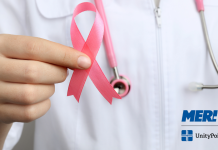Preeclampsia is a complication of pregnancy that can begin as early as 20 weeks into pregnancy or in some cases, following delivery. It affects the arteries carrying blood to the placenta. If the placenta doesn’t get enough blood, the baby may receive inadequate blood, oxygen and nutrients — which can lead to slow growth or preterm birth.
With preeclampsia, a pregnant person might have high blood pressure and/or high levels of protein in urine that indicates kidney damage or other signs of organ damage. However, some pregnant people may have no noticeable symptoms.
Our partners at UnityPoint Health-Meriter are helping to bring awareness to this condition during PREECLAMPSIA AWARENESS MONTH.
 FIRST SIGNS OF PRE-ECLAMPSIA
FIRST SIGNS OF PRE-ECLAMPSIA
The first signs of pre-eclampsia are often detected during routine prenatal visits with a healthcare provider, and your healthcare provider should be monitoring any pregnant patients for this complication.
Some other complications preeclampsia can cause for the pregnant person and baby include placental abruption, when the placenta separates from the wall of the uterus before birth which can also impact oxygen to the baby, low birth weight, problems with how blood clots, stroke and postpartum hemorrhage, which is heavy bleeding after giving birth. Postpartum hemorrhage is a rare condition, but if not treated in can lead to shock and death.
SYMPTOMS
Along with high blood pressure, symptoms for preeclampsia may include:
- Excess protein in urine or other signs of kidney failure
- Decreased levels of platelets in blood
- Increased liver enzymes that indicate liver problems
- Severe headaches
- Changes in vision, including temporary loss of vision, blurred vision or light sensitivity
- Shortness of breath
- Pain in the upper belly, usually under the ribs on the right side
- Nausea or vomiting
Weight gain and swelling are normal during a healthy pregnancy. However, sudden weight gain or a sudden appearance of swelling — especially in the face and hands — could be a sign of preeclampsia.
TREATMENT
Most pregnant people with mild preeclampsia deliver around 37 weeks. If a pregnant person has mild preeclampsia before 37 weeks, a provider will check your blood pressure and urine regularly. Your provider may ask you to do kick counts to track how often your baby moves.
If you have severe pre-eclampsia, you might have to stay in the hospital so your provider can closely monitor you and your baby. You may also need to deliver your baby early.
WHEN TO SEE A DOCTOR
- It’s important to attend all of your regular prenatal visits, so your healthcare provider can regularly monitor your blood press and screen for other signs and symptoms.
- You should contact your provider immediately if you develop severe headaches, blurred vision or visual disturbances, severe belly pain or severe shortness of breath.
- Because headaches, nausea, aches and pains are common in an average pregnancy, it can be difficult to know when new symptoms are simply part of being pregnant or indicate something serious. Never hesitate to contact your provider about your symptoms.
For more information – or to receive treatment/care – you can contact UnityPoint Health-Meriter.












